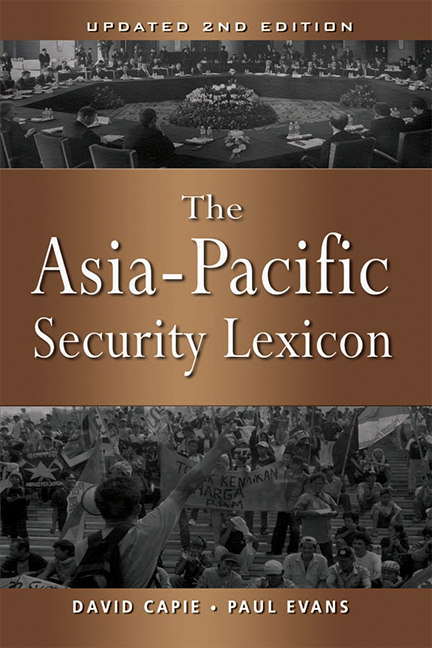Book contents
- Frontmatter
- Contents
- Abbreviations
- Introduction to the Second Edition
- Ad Hoc Multilateralism
- A la Carte Multilateralism
- The “ASEAN Way”
- Balance of Power
- Bilateralism
- Coalition of the Willing
- Coercive Diplomacy
- Collective Defence
- Collective Security
- Common Security
- Comprehensive Security
- Concert of Powers
- Concerted Unilateralism
- Confidence-Building Measures
- Confidence- and Security-Building Measures
- Constructive Intervention
- Cooperative Security
- Engagement
- Flexible Consensus
- Human Security
- Humanitarian Intervention
- Middle Power
- Multilateralism
- Mutual Security
- New Security Approach
- Non-Traditional Security
- Open Regionalism
- Peaceful Rise
- Pre-emption and Preventive War
- Preventive Diplomacy
- Security Community
- Terrorism
- Track One
- Track One-and-a-Half
- Track Two
- Track Three
- Transparency
- Trust-Building Measures
- About the Authors
Open Regionalism
Published online by Cambridge University Press: 21 October 2015
- Frontmatter
- Contents
- Abbreviations
- Introduction to the Second Edition
- Ad Hoc Multilateralism
- A la Carte Multilateralism
- The “ASEAN Way”
- Balance of Power
- Bilateralism
- Coalition of the Willing
- Coercive Diplomacy
- Collective Defence
- Collective Security
- Common Security
- Comprehensive Security
- Concert of Powers
- Concerted Unilateralism
- Confidence-Building Measures
- Confidence- and Security-Building Measures
- Constructive Intervention
- Cooperative Security
- Engagement
- Flexible Consensus
- Human Security
- Humanitarian Intervention
- Middle Power
- Multilateralism
- Mutual Security
- New Security Approach
- Non-Traditional Security
- Open Regionalism
- Peaceful Rise
- Pre-emption and Preventive War
- Preventive Diplomacy
- Security Community
- Terrorism
- Track One
- Track One-and-a-Half
- Track Two
- Track Three
- Transparency
- Trust-Building Measures
- About the Authors
Summary
One of the earliest principles agreed upon for the founding of an Asia-Pacific community. The term's origins trace back to discussions about regional economic co-operation in the late 1970s. It became more prominent when it was cited as an ideal for the future economic development of the region by the first Pacific Economic Cooperation Council (PECC) in Canberra, in September 1980 and subsequently by the first Asia-Pacific Economic Cooperation (APEC) Meeting in Canberra in 1989.
Put simply, open regionalism “involves regional economic integration without discrimination against economies outside the region.” As defined by Ross Garnaut and Peter Drysdale, it includes the use of integrative processes and regional co-operation to mutually reduce trade barriers within the Asia-Pacific region without discriminating against outsiders. Garnaut contrasts it with what he calls “discriminatory regionalism” which describes arrangements such as customs unions, free trade areas, and preferential trade areas, where trade barriers at members' borders are lower for trade with members than with non-members. He identifies the European Union and the North American Free Trade Area (NAFTA) as examples of discriminatory regionalism. According to Andrew Elek, under open regionalism “regional trade liberalization is to be promoted, provided it is consistent with GATT [General Agreement on Trade and Tariffs] principles and not to the detriment of other economies.” Writing in 1992, Elek said that open regionalism was “unique” to the Asia-Pacific region and “radically different from the discriminatory nature of the EC [European Community]”.
According to Garnaut, there are three analytic elements of open regionalism. First, it involves the adoption of open policies in relation to official barriers to trade. Second, open regionalism requires that regional cooperation should be pursued with the goal of reducing non-official barriers to trade and increasing the volume of regional trade without any element of discrimination against outsiders. Third, it requires regional market integration. This can take place “as a result of governments getting out of the way of profit-maximizing patterns of trade; or through the dynamics of private discovery of profit maximizing patterns without any change in the policy stance of governments.”
- Type
- Chapter
- Information
- The Asia-Pacific Security Lexicon (Upated 2nd Edition) , pp. 179 - 186Publisher: ISEAS–Yusof Ishak InstitutePrint publication year: 2007



